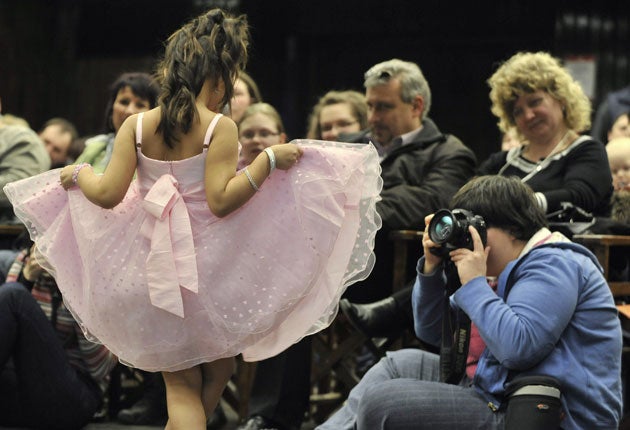Pre-school girls are latest target of child cosmetics firms
Parents fight back as their daughters are bombarded with messages that sexualise their childhood

Make-up aimed at girls as young as three will be the next battleground for campaigners concerned about overly-sexualised products targeting children.
The campaign group Pinkstinks, which challenges the culture of pink for girls, will soon launch "Slap – on the face of childhood" to call on retailers to stop selling make-up marketed at youngsters. It also hopes to raise parents' awareness of the issue.
The move comes as an independent review into the sexualisation of childhood, commissioned by Prime Minister David Cameron, publishes its findings tomorrow. The inquiry is expected to recommend that music videos be subjected to an age-rating system, and to suggest advertisements with sexual imagery are banned near schools.
Mr Cameron asked Reg Bailey, the chief executive of the Mothers' Union, to examine the pressures on children to grow up too quickly and become consumers. The review is expected to call for it to be easier for parents to complain about over-sexualised products targeted at pre-teens.
Parents are becoming increasingly concerned about the types of products that are aimed at young girls, prompting last year's launch of the Let Girls Be Girls campaign from the parenting website Mumsnet.
Mr Cameron revealed that he had told his six-year-old daughter Nancy to stop listening to Lily Allen's music because he thought some of the sexual references were inappropriate for a child her age. Raunchy videos by pop stars such as Lady Gaga and Rihanna, who have a pre-teen following, have also attracted criticism.
Pinkstinks, which was founded three years ago by the sisters Abi and Emma Moore, will launch its cosmetics campaign within the next six weeks and hopes to mobilise support from its 15,000 Facebook fans. The organisation is not saying that children should not be able to experiment with make-up and try their mother's lipstick, but is concerned about the "cynical" targeting of make-up at children and the message the "onslaught" of advertising is sending to children as young as three.
Abi Moore said: "This is about the beauty industry getting their claws into our little girls as early as they can." She claimed it was "about time the retailers took some of the responsibility" of deciding what products were suitable rather than leaving it solely to parents to police. She questioned whether make-up was what society really wanted for young girls. "This is not about face paint... This is about selling stuff, and lots of it," she said.
A video for the group's campaign cites research from the United States that suggests eight to 12-year-old girls are that country's largest growth market for cosmetics, with tweens spending $40m (£24.3m) a month on beauty products. Earlier this year, the US retail giant Walmart courted controversy by targeting the age group with the launch of its GeoGirl range of products such as lip glosses, eye shadows and mascara.
Several UK retailers also sell make-up for children, as well as holding beauty salons and pageants aimed at youngsters. One of Pinkstinks's targets is the US-based chain Toys R Us, which sells a number of make-up kits labelled as being suitable for children aged five or older.
Abi Moore said: "We are seeing make-up marketed towards younger and younger children. It was first on our radar because of our own children – I have got two boys and Emma's got two girls. She was getting party bags sent home with her four-year-old which had make-up in them."
She said targeting make-up at young girls was part of the broader "pinkification and stereotyping message which is absolutely bound up in most toys that are sold". She added that make-up for young girls was not only about sexualisation but also objectification. She said: "Selling make-up to three-year-olds is sexualising them because the point of make-up is to make yourself more beautiful for someone else to look at you."
Toys R Us could not be reached for comment.
Join our commenting forum
Join thought-provoking conversations, follow other Independent readers and see their replies
Comments
Bookmark popover
Removed from bookmarks